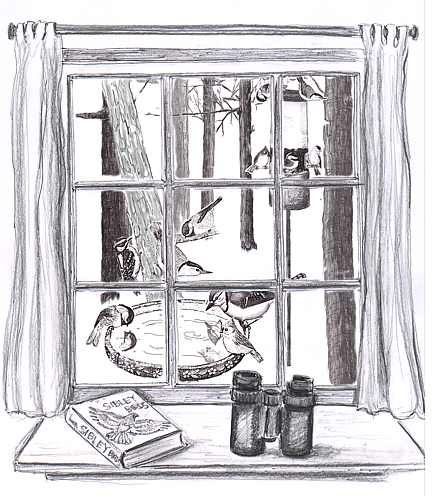
Dear Bird Folks:
My ten year old daughter asked me about feeding wild animals. Her concern is that we are constantly being reminded with signs that read “Don’t feed the bears”, “Don’t feed the ducks” and in some places “Don’t feed the gulls”. If all that is wrong, why are so many people feeding birds? Isn’t feeding birds just as wrong?
-Peter, Orleans
Oh Swell Peter,
As if business this time of year isn’t tough enough, now I have a ten-year old trying to put some kind of ethical twist on things. This, I don’t need. Doesn’t she have a video game to play or a younger brother to tease? What about a pony? Can’t you get the kid a pony so she can focus on cleaning stables and not on the moral ramifications of bird feeding?
Actually, Bill, I’m surprised that I don’t hear this question more often. It is odd that it’s okay to feed backyard birds and not okay to feed many other forms of wildlife. Why? Well first of all, there is the obvious danger in feeding some creatures. The number of people who have been eaten by bears is nearly three times greater than the number of people who have been eaten by chickadees. Except for the occasional, accidental, hummingbird beak stuck in the eye or woodpecker attacking people with artificial legs, backyard birds are mostly harmless.
Everything that we humans do impacts wildlife at some level, either good or bad, usually bad. Feeding bears has caused them to lose their fear of people, which has led to unfortunate confrontations. In addition, if the crap we eat isn’t all that good for us, it is probably detrimental to the long term health of bears.
Many towns have posted areas asking people not to feed ducks. Feeding ducks on a small scale is fairly harmless, but when too much food is poured into too small an area, lots of problems can arise. A body of water can naturally support a certain number of waterfowl. When the available food is artificially increased, the duck population also increases. The extra birds can strip the area of all natural food and their droppings can lead to a serious pollution problem.
I doubt if feeding gulls the occasional French fry has lead to too many major environmental problems. The complaints about those gulls mostly come from the snooty boating crowd upset with the gull’s habit of contributing to the poop deck. It is the tons of wasted food from our open dumps and landfills that has increased the gull population, but that’s a subject for another day.
Backyard bird feeding is also not without problems. I’m sure many birds die from diseases spread through improperly maintained feeders. Many other birds are attracted to our yards only to die from collisions with our windows. Then there are the millions and millions of birds that are killed by our uncontrolled pets. Our yards are not always as safe as we think they are and birds suffer for it.
It’s not all bad news however. There is little doubt that feeders have increased and expanded the range of many birds. Forty years ago cardinals and titmice were rarely seen in these parts. Without feeders to feed from in the winter, cardinals might still be an uncommon bird around here.
There is no getting around it, everything that we do impacts every level of our ecosystem. Right now the jury is still out as to the long term benefits or problems caused by our backyard feeding. At this point, the good seems to outweigh the bad. It may be many years before the answer to this question is clear.
What is very clear is that humans are the real beneficiaries from feeding birds. (I’m talking about real humans and not money grubbing merchants like me.) For many people, birds are the only company that they have on a cold winter’s day. For others, backyard birds are their only or last connection with nature.
Your ten-year old is right to question any and all of our dealings with our environment. I wish more people would do that. As of this moment, backyard bird feeding, although not perfect, isn’t the moral equivalent of setting up oil rigs in the Alaskan wilderness. And maybe, if we continue to be conscientious with our feeding practices, there will never be a need to post a “no bird feeding” sign in anyone’s backyard.